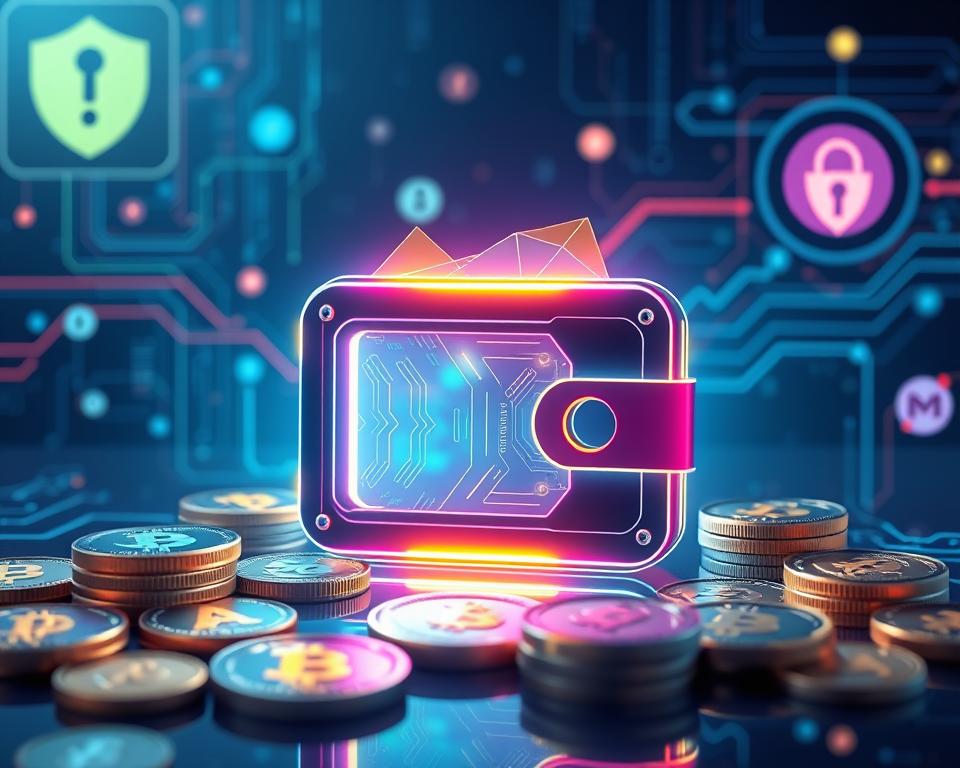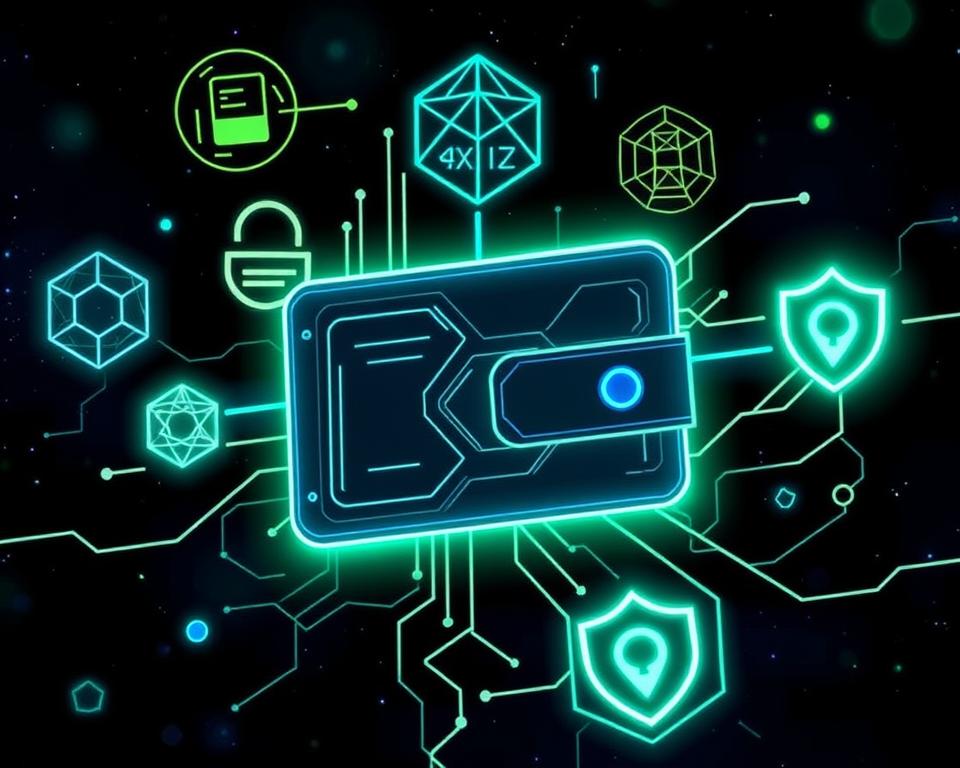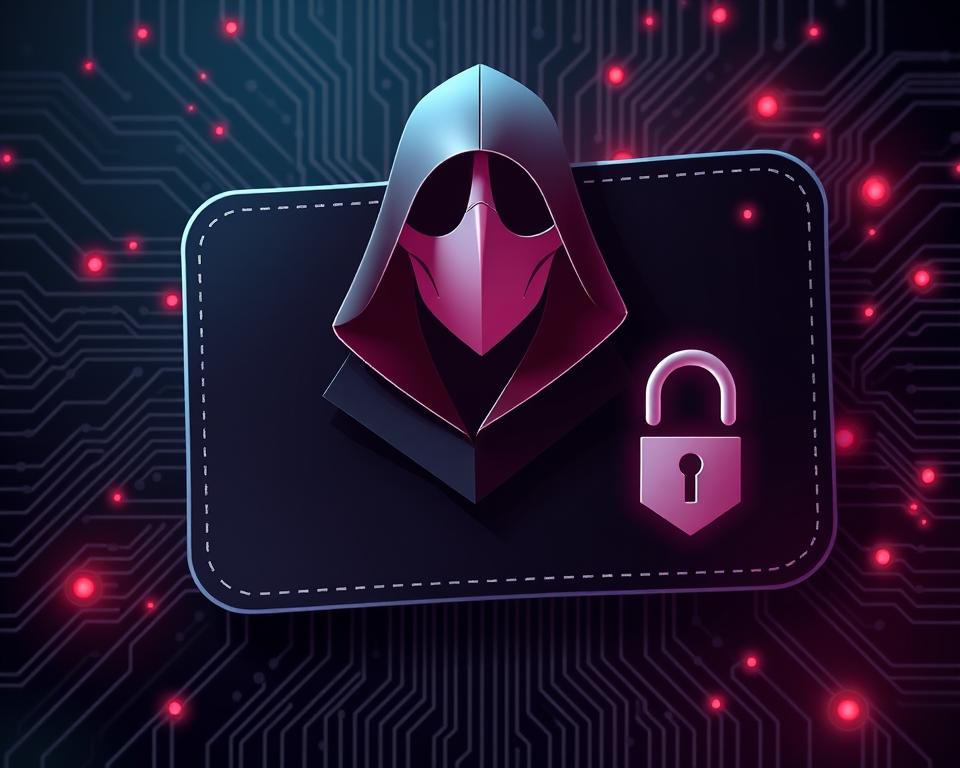Choosing the right crypto wallet is key in 2024 as more people use cryptocurrencies. As an investor, I look for security, ease of use, and compatibility with my assets. This article will guide you through the top 7 best crypto wallets for 2024. It will highlight their unique features and benefits to help you protect your digital wealth.
Key Takeaways
- Researching and comparing 25 crypto wallets based on 20 distinct criteria took approximately 72 hours.
- 40% of the wallets analyzed are hardware-based, while 60% are software or web-based.
- The analysis resulted in 7 recommended best hot wallets and 3 best cold wallets.
- 15% of users looking for crypto wallets mistakenly thought they were crypto exchanges.
- Trust Wallet supports over 10 million coins and tokens, while Electrum only supports Bitcoin.
Introduction
The cryptocurrency market is growing fast, making it vital to pick the right crypto wallet. In 2024, the right wallet is key for keeping your digital assets safe and easy to access. With more people using crypto, the risks of losing or mismanaging your money have gone up.
It’s important to keep your crypto in a secure, easy-to-use wallet. If you don’t, you could lose your money to theft or mismanagement. This could be a big setback for your investments.
The Growing Adoption of Cryptocurrencies and Associated Risks
More people and businesses are using digital assets for investment and transactions. This growth has brought new risks, like theft or losing your crypto. Choosing the right wallet is crucial to protect your digital wealth from these risks.
| Wallet Name | Supported Cryptocurrencies | Key Features |
|---|---|---|
| Guarda Wallet | Over 400,000 crypto assets | Secure, user-friendly, supports a wide range of digital currencies |
| Exodus Wallet | Over 250 crypto assets | Intuitive interface, supports multiple cryptocurrencies, built-in exchange |
| Electrum Wallet | Only Bitcoin | Lightweight, open-source, focused on Bitcoin security and privacy |
| Mycelium Wallet | Over 8 cryptocurrencies | Mobile-focused, strong security features, supports hardware wallets |
| Coinbase Wallet | Thousands of digital currencies and tokens | Beginner-friendly, supports a vast array of cryptocurrencies, linked to Coinbase exchange |
We will look deeper into why choosing the right crypto wallet is important. We’ll explore different types of wallets and their features. This will help you make a smart choice in 2024.

The Significance of Selecting the Ideal Crypto Wallet in 2024
When picking a crypto wallet for 2024, think about security, ease of use, and compatibility. It’s key to have strong security like multi-factor authentication and cold storage to keep your digital assets safe. A wallet that’s easy to use and works well with your favorite cryptocurrencies makes managing your crypto smooth and efficient. This way, you can handle your crypto with confidence.
Importance of Security, Ease of Use, and Compatibility
Crypto wallets vary, each with special features for different needs. Ledger and Trezor hardware wallets keep your private keys safe offline. Electrum and Exodus software wallets let you access your crypto easily from your device. Web-based wallets, such as Coinbase Wallet and MetaMask, work well with decentralized apps. For extra security, consider paper wallets or multi-signature wallets.
| Wallet Type | Key Features | Supported Assets |
|---|---|---|
| Hardware Wallets | Highest security, offline storage of private keys | Over 5,500 assets (Ledger), over 9,000 assets (Trezor) |
| Software Wallets | Convenient access, desktop and mobile compatibility | Over 300 assets (Exodus) |
| Web-based Wallets | Seamless integration with dApps, user-friendly | Over 650,000 assets and DeFi apps (MetaMask), over 10 million assets across 100 blockchains (Trust Wallet) |
| Paper Wallets | Highest offline security, advanced for tech-savvy users | Supports any cryptocurrency that can be represented by a private key |
| Multi-signature Wallets | Enhanced security through multiple signatories | Supports a wide range of cryptocurrencies, depending on the specific wallet |
Think about these wallet types and their features to choose the right one for you in 2024.

Best Hot Wallets for 2024
Hot wallets, or online wallets, are a top pick for those who use cryptocurrency. They are easy to use and very accessible. For 2024, some top choices include Coinbase Wallet, MetaMask, Trust Wallet, Electrum, and BlueWallet. These wallets mix security, ease of use, and support for many digital assets. They work well for both new and seasoned crypto investors.
Coinbase Wallet supports over 5,500 digital assets and links easily with the Coinbase exchange. Trust Wallet, linked to Binance, connects to big exchanges and supports over 10 million assets. Electrum focuses on Bitcoin, offering quick transactions and extra security.
Guarda is another key wallet, offering self-custody for over 400,000 assets. Users can buy, sell, stake, and exchange crypto right from the wallet. MetaMask is a favorite for Ethereum transactions, supporting ETH and tokens based on it. It works on mobile and web, and connects with decentralized apps (dApps).
When picking a hot wallet, think about the assets it supports, its security, ease of use, and how it works with other services. Choosing the right wallet lets you manage your cryptocurrency online safely and easily.
| Wallet | Assets Supported | Key Features |
|---|---|---|
| Coinbase Wallet | 5,500+ | Easy Coinbase integration, supports a vast selection of assets |
| Trust Wallet | 10,000,000+ | Non-custodial, supports major exchanges, vast asset coverage |
| Electrum | 250+ | Focused on Bitcoin, fast transactions, additional security features |
| Guarda | 400,000+ | Free to use, supports buying, selling, staking, and exchanging crypto |
| MetaMask | ETH and ETH-based tokens | Mobile and web browser access, dApp integration, free storage |

“In 2024, Bitcoin holders can exercise direct control of their funds by holding their own Bitcoin keys, eliminating reliance on third-party institutions like banks.”
Best Crypto Wallets
In 2024, the best crypto wallets include hot, hardware, and hybrid options. Hardware wallets like KeepKey, Ledger Nano S Plus, and SafePal keep your private keys offline for top security. They’re great for storing crypto long-term. Hybrid wallets, such as the Crypto.com DeFi Wallet, mix hot and cold wallet security for easy management of your digital assets.
Let’s look at some top crypto wallets for different needs:
- Coinbase Wallet: Supports 8 blockchains and interacts with DeFi protocols.
- MetaMask: Supports Ethereum and ERC-20 tokens but doesn’t support non-EVM cryptocurrencies.
- Guarda Wallet: Supports over 50 blockchains but has high exchange fees (3.5%).
- Crypto.com DeFi Wallet: Supports over 30 blockchains and has a 0.05% service fee on staking rewards.
- Trust Wallet: Supports 70 blockchains, including Bitcoin and Ethereum, but lacks two-factor authentication.
- Exodus Wallet: Supports 364 cryptocurrencies and offers customer support via chat and email but lacks two-factor authentication.
- ZenGo Wallet: Has a 4.1-star rating and is known for easy account recovery but has slower transfer times and limited security for non-paying users.
For the highest security, consider hardware wallets like Ledger, Trezor, and KeepKey. Ledger supports over 5,000 cryptocurrencies and works with software wallets, starting at $79. Trezor supports around 1,000 cryptocurrencies and costs $69. KeepKey supports about 40 cryptocurrencies but has been criticized for its quality and support.
| Wallet | Supported Cryptocurrencies | Notable Features | Pricing |
|---|---|---|---|
| Ledger | 5,000+ | Collaborates with software wallets | $79 (cheapest model) |
| Trezor | Around 1,000 | – | $69 (cheapest model) |
| KeepKey | Around 40 | Lower quality hardware, limited support | $49 |
There are many crypto wallets to choose from, each offering different benefits. Whether you need top security, easy use, or a mix of both, there’s a wallet for you. By looking at features, compatibility, and price, you can pick the right one to protect your digital assets in 2024 and beyond.

Prioritizing Privacy and Anonymity in Crypto Wallets
In the crypto world, it’s key to know the difference between pseudonymous and anonymous transactions. Bitcoin is often thought to be fully anonymous, but it’s really pseudonymous. Your wallet address is like a unique name, not your real identity. But, some like Monero and Zcash use special tech to really hide your transactions and keep you private.
Privacy-Enhancing Technologies
Privacy tech is vital for keeping crypto transactions secret. CoinJoin blends many transactions together, hiding where the money goes. Ring signatures and zero-knowledge proofs let users show a transaction is real without sharing too much. Stealth addresses make it hard to follow the money back to you.
- Samourai Wallet is known for its strong privacy tools, including stealth addresses and Tor support, plus a coin mixer called Whirlpool.
- Wasabi Wallet, a desktop option, uses CoinJoin for mixing coins and Tor for more privacy.
- Monero wallets like Monerujo and Cake Wallet, supporting Monero (XMR), offer top anonymity with ring signatures and stealth addresses.
- Electrum Wallet, with Tor, boosts privacy a lot.
- RuufPay Wallet is a mobile wallet supporting many cryptos, with good privacy for everyday use.
Monero wallets have great privacy features, making transactions private by default. But, some antiviruses might see Monero wallets as malware, so keep them updated for safety and privacy.
Other cryptos like Grin and Beam use Mimblewimble for better privacy and speed. Zcash wallets have cool privacy tools with zk-SNARKs, but they need more power and have some setup worries.

“Keeping user privacy safe is key in the crypto world, and privacy-focused wallets are crucial for keeping transactions secret.”
Evaluating Key Features of Anonymous Wallets
Choosing an anonymous crypto wallet means knowing the difference between non-custodial and custodial wallets. Non-custodial wallets let you control your private keys, keeping your funds safe from others. Custodial wallets, however, hold your private keys for you, which might risk your financial privacy.
Non-Custodial vs. Custodial Wallets
Non-custodial wallets give you more privacy and security. You’re in charge of your crypto, keeping your private keys safe. This way, no one else can touch your money, keeping your anonymity safe.
Custodial wallets are run by a third party, like an exchange. They offer more features but might risk your privacy. If they’re compromised, they could share your info, threatening your anonymity.
End-to-End Encryption and No KYC Requirements
Anonymous crypto wallets use end-to-end encryption to keep your transactions safe. This means no one can see your financial info, keeping you private.
They also don’t need Know Your Customer (KYC) checks. This lets you keep your financial life private and avoid sharing personal details with others. It’s great for those who want to keep their crypto use to themselves.

“Maintaining the privacy and security of your crypto assets is crucial in the rapidly evolving digital finance landscape. By understanding the key features of anonymous wallets, you can make an informed decision and protect your financial well-being.”
The Role of Decentralization in Enhancing Wallet Privacy
Decentralization is key to making crypto wallets more private and anonymous. In a decentralized system, no single entity controls all your transaction info. Instead, info is spread out across many nodes. This makes it hard for anyone to link your financial actions to you. This way, your privacy is protected, and your transactions stay hidden from others.
How Decentralization Enhances Anonymity
The decentralized nature of crypto wallets helps keep you anonymous. Without a central authority, your transactions are spread out. This makes it tough to trace your financial activities back to you. So, your personal info and transaction history stay private, keeping your identity safe.
Decentralized Exchanges (DEXs) and Peer-to-Peer Trading
Decentralized exchanges (DEXs) are vital for crypto wallet privacy. They allow direct trading of digital assets without a middleman. This way, you don’t have to share personal info or go through a central platform that could risk your privacy.
| Feature | Centralized Wallets | Decentralized Wallets |
|---|---|---|
| Control over Private Keys | Centralized wallets, like those from Coinbase or Binance, maintain control over private keys. | Decentralized wallets grant complete control over private keys and funds. |
| KYC Requirement | Centralized wallets often require Know Your Customer (KYC) processes. | Decentralized wallets enable direct access to DeFi and Web3 without the need for KYC. |
| Censorship Resistance | Centralized wallets are susceptible to censorship and control by third parties. | Decentralized wallets are resistant to censorship and offer financial freedom. |
| Accessibility | Centralized wallets are bound by geographical limitations. | Decentralized wallets are not bound by geographical limitations and offer global accessibility. |
By using decentralization, crypto wallets can boost privacy and anonymity. This gives users more control over their digital assets and financial dealings.

Factors to Consider When Choosing an Anonymous Crypto Wallet
When picking an anonymous crypto wallet, think about what privacy and security you need. Think about how much anonymity you want, the cryptocurrencies you’ll hold, and how much control over your private keys you desire. Check the wallet’s security like end-to-end encryption, multi-factor authentication, and offline storage to keep your digital assets safe.
Evaluating Your Privacy Needs and Security Requirements
An anonymous crypto wallet’s main job is to keep your privacy and hide your transactions. Look for wallets with advanced privacy tools like CoinJoin, ring signatures, zero-knowledge proofs, and stealth addresses. These help hide your transaction history and make it hard for others to link your wallet to you.
Also, think about how much control you want over your private keys. Non-custodial wallets give you full control, which means more privacy and security. Custodial wallets, where someone else holds your keys, offer less privacy and security.
Assessing User-Friendliness and Compatibility with Preferred Cryptocurrencies
Privacy and security are important, but so is how easy the wallet is to use and if it works with your cryptocurrencies. A wallet that’s easy to use and supports your cryptocurrencies makes managing your digital assets smooth. This lets you focus on keeping your privacy and staying anonymous.
| Wallet | Cryptocurrencies Supported | Key Features | User Rating |
|---|---|---|---|
| Ledger Nano X | Over 100 cryptocurrencies | Offline storage, multi-factor authentication, supports over 5,500 crypto assets | 4.8/5 |
| ZenGo | Over 70 cryptocurrencies | Non-custodial, biometric authentication, supports multiple network fee modes | 4.6/5 |
| Electrum | Bitcoin | Open-source, secure, low wait time, supports 2-factor authentication | 4.5/5 |
By looking at your privacy, security needs, and how easy the wallet is to use, you can pick a wallet that works well for you. This ensures a smooth and secure way to manage your digital assets while keeping your anonymity.

Conclusion
Choosing the best crypto wallet for 2024 is crucial for your digital assets’ security, access, and privacy. It’s important to pick the right wallet by looking at its features and your needs. This guide has given you the info to pick from the top 7 crypto wallets for 2024 that fit your needs.
Hardware wallets like Ledger Nano X and Trezor Model T are top choices for security. They store private keys offline and support many cryptocurrencies. Hot wallets such as Trust Wallet and Coinbase Wallet are easy to use and secure for daily transactions.
For those wanting more privacy, anonymous wallets are a good option. They focus on privacy and decentralization. This makes them great for those who want more anonymity in their crypto dealings.
When picking a crypto wallet in 2024, think about what you need most. Look at security, ease of use, and the features you want. By doing your research and considering what we’ve talked about, you can pick a wallet that keeps your digital assets safe and private. With the right crypto wallet, you can confidently move through the changing crypto world.
FAQ
What are the key factors to consider when selecting a crypto wallet for 2024?
When picking a crypto wallet for 2024, focus on security, ease of use, and compatibility. It’s key to have strong security like multi-factor authentication and cold storage. A wallet should also be easy to use and work well with your favorite cryptocurrencies.
What are the different types of crypto wallets available?
There are many crypto wallets out there. You can choose from hardware, software, web-based, mobile, paper, and multi-signature wallets. For top security, consider hardware wallets like Ledger and Trezor. For easy access, software wallets such as Electrum and Exodus are great.
Web-based wallets, like Coinbase Wallet and MetaMask, are perfect for using with decentralized apps.
What are the best hot wallets for 2024?
Top hot wallets for 2024 include Coinbase Wallet, MetaMask, Trust Wallet, Electrum, and BlueWallet. These wallets are great for their mix of security, ease of use, and support for many digital assets. They’re perfect for both new and experienced crypto users.
What are the best crypto wallets for 2024?
The best crypto wallets for 2024 also include hardware and hybrid options. For top security, consider hardware wallets like KeepKey, Ledger Nano S Plus, and SafePal. They store your private keys offline, making them great for long-term storage.
Hybrid wallets, such as the Crypto.com DeFi Wallet, offer both the ease of hot wallets and the security of cold wallets. They’re a versatile choice for managing your digital assets.
What is the difference between pseudonymous and anonymous transactions in the crypto space?
Pseudonymous and anonymous transactions are not the same. Bitcoin, for example, is pseudonymous, using your wallet address as a unique identifier without revealing your real identity. But, privacy-focused coins like Monero and Zcash use advanced tech to truly anonymize transactions, protecting your privacy.
What are the key features to look for in an anonymous crypto wallet?
Look for non-custodial wallets for true control over your private keys. This means no third party can access your funds. Also, choose wallets with end-to-end encryption and no KYC verification to keep your info private.
How does decentralization enhance the anonymity of crypto wallets?
Decentralization boosts privacy and anonymity in crypto wallets. With no single point of control, it’s hard to trace your transactions. Decentralized exchanges let you trade directly, avoiding central authorities.
What factors should I consider when choosing an anonymous crypto wallet?
Think about your privacy and security needs when picking an anonymous crypto wallet. Consider how much anonymity you need, the cryptocurrencies you’ll hold, and your control over private keys. Check the wallet’s security, like end-to-end encryption and offline storage, to keep your assets safe.
Also, make sure it’s easy to use and supports the cryptocurrencies you want. This ensures a smooth experience while keeping your privacy and anonymity.



Completely I share your opinion. It is good idea. It is ready to support you.
It agree, this idea is necessary just by the way